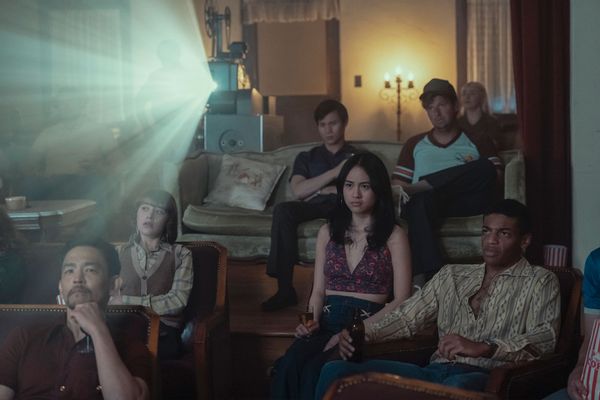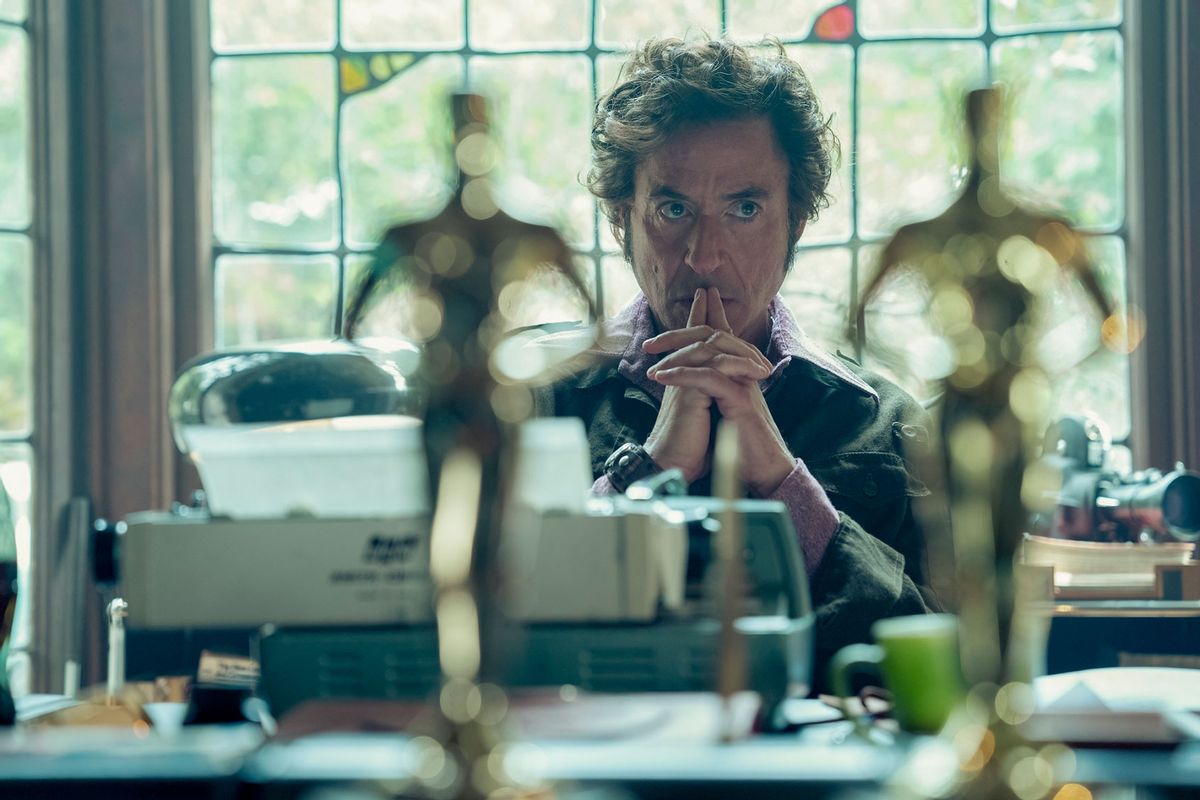From the moment Nicos Damianos makes his entrance in “The Sympathizer” we recognize precisely who he is, other than the fourth character Robert Downey Jr. plays in the series. He’s the director who can do no wrong, whose vision is absolute, who never apologizes.
Since he’s shooting what he believes will be his great masterpiece on the Vietnam War experience, “The Hamlet,” the character’s natural real-world corollary should be “Apocalypse Now” director Francis Ford Coppola. Its production was as legendarily chaotic as the creative havoc Damianos wreaks in the fourth episode, which travels through The Captain’s stressful experience as the movie’s cultural consultant.
But according to director and co-showrunner Park Chan-wook, Damianos isn’t a parody of any specific person – including himself, he told Salon in a recent interview.
Instead, “[He] is one facet showing the power of America, which is also its pop culture. Because it is one element that composes the system of America,” Park said.
He goes on to explain that Downey Jr.’s quartet of characters represents the various faces of America’s power.
“There's military, education and political. And its art is also on the same level as those categories. [And] artists can be a little complex.”
That’s putting it mildly. We meet Damianos at the end of the third episode, “Love It or Leave It,” when he arrives late to a meeting at a steakhouse – “the natural habitat of the most dangerous creature on Earth: the white man in a suit and tie.” Downey Jr.’s CIA agent Claude drags The Captain (Hoa Xuande) there to meet the Oscar winner’s other personas – a right-wing politician and a professor with a twisted Orientalism fetish.
Downey Jr.'s shaggy-haired director strolls in after they’re seated and roars, “Thank God I’m here.” Almost immediately he insults The Captain by blurting a horrific epithet that spurs the hero to lunge at him, before enlisting him as the consultant on his Vietnam War opus.
"Artists can be a little complex."
“To ensure its cultural authenticity,” Damianos explains which, as Park pointed out in our conversation, qualifies as progressive by 1970s American cinema standards.
Park refers to Damianos as The Auteur. “Fundamentally, he is an artist,” he says. “But in a larger context, this [is] a character who is trying to display or perhaps show off the mighty power of what America is to the world."
The Auteur’s episode, “Give Us Some Good Lines,” is the first of the season that Park doesn’t direct, leaving that duty to Fernando Ferreira Meirelles (“The Constant Gardener”). Instead, he and co-showrunner Don McKellar focused their attention on the script which, tellingly, presents his auteur as a man obsessed with “authenticity.”
According to whom? The Captain arrives on set on the first day, eager to do his job of ensuring the Vietnamese people are developed and portrayed realistically. But Damianos thwarts his simplest request to add any dialogue in the movie for his Vietnamese characters – none of whom are played by Vietnamese people, which they only find out after production has begun.
 John Cho, Hua Xuande, Vy Le and Maxwell Whittington Cooper in "The Sympathizer" (HBO)And yet, Damianos’ Auteur praises himself for his willingness to consider the perspective of the Vietnamese people, who he has all figured out, describing them to The Captain as “innocent, modest, docile . . . much like the water buffalo.”
John Cho, Hua Xuande, Vy Le and Maxwell Whittington Cooper in "The Sympathizer" (HBO)And yet, Damianos’ Auteur praises himself for his willingness to consider the perspective of the Vietnamese people, who he has all figured out, describing them to The Captain as “innocent, modest, docile . . . much like the water buffalo.”
“I don't want to hear people talking about their suffering. I want to feel it. Feel it,” Damianos says. “You understand? It's an emotive medium. Feeling is believing.”
The Captain counters, “See, the Vietnamese farmers are actually somewhat different from the water buffalo. For one thing, we're a lot more talkative. You'd be surprised!”
“Give Us Some Good Lines” is rich with the dark humor that makes Viet Thanh Nguyen's 2016 Pulitzer Prize-winning novel singular and defiant of categorization. The Captain’s absurd experience is maddening — and quite frequently hilarious.
We need your help to stay independent
Since Damianos and the rest of his white crew don’t understand Vietnamese, the Captain, who’s still operating as a double agent for Vietnam’s communist government, can slip a little socialist propaganda into the script that he assures the director is harmless.
Nevertheless, he hits a few roadblocks with his fellow Vietnamese refugees he’s gotten hired as extras, many of whose family members were tortured or killed by Viet Cong soldiers. “I’m not going to say the stupid communist slogan in your . . . movie for 15 bucks a day!” one yells as the cameras are rolling.
The Auteur cuts and moves on, none the wiser and, more to the point, not caring.
What Park and Nguyen were hoping to capture is the harmful, exploitative choices creatives like Damianos make in the name of authenticity.
"When it comes to the authenticity that the Auteur is very obsessed about . . . we were questioning the very idea."
Some of this is very funny, like the Captain’s best friend Bon (Fred Nguyen Khan) finding his calling as an extra who gets killed over and over again. He remarks that dying "authentically" for the camera makes Bon the happiest he’s been since they came to the States.
As the production wears on Meirelles eases off the camp and merges into “Hearts of Darkness” behavioral obscenity. David Duchovny’s star, a “legendary method icon,” uses the cover of his character to abuse The Captain and antagonize his Black co-star Jamie Johnson (Maxwell Whittington-Cooper) a popular soul singer who draws the attention of his boss' daughter Lana (Vy Le) after she sneaks onto the set. Duchovny's actor isn’t merely racist – all part of being in character, understand – he’s demented, wandering off the set with a loaded weapon and returning with a dead deer slung across his shoulders.
 David Duchovny in "The Sympathizer" (HBO)The worse Duchovny’s star behaves, the more odious Damianos becomes – partly to placate him, but mainly because the star gives the director an excuse to broadcast his cruelest impulses.
David Duchovny in "The Sympathizer" (HBO)The worse Duchovny’s star behaves, the more odious Damianos becomes – partly to placate him, but mainly because the star gives the director an excuse to broadcast his cruelest impulses.
Soon we see the Auteur’s greatest concern is to celebrate the agony and despair of the Vietnamese people and other non-white groups. Duchovny’s hero strides through the jungle as his co-star’s character is shot, and the single Asian guy on his squad (played by John Cho) is tortured to death.
The Captain, meanwhile, flashes back to his various traumas thanks to Damianos’ ugly inspirations, the nadir being a scene where a character named after the Captain’s mother, played by Lana, shows her being violently raped as the director chatters his teeth as if he’s watching a porterhouse being seared.
The Auteur calls it a tribute to her pain. “I’m telling you, the audience will react with visceral revulsion. It will be permanently scarred. It’s the right thing to do! And I . . . did it for you!”
Want a daily wrap-up of all the news and commentary Salon has to offer? Subscribe to our morning newsletter, Crash Course.
“When it comes to the authenticity that the Auteur is very obsessed about, for me and Viet as well, we were questioning the very idea,” Park explained. “. . . The thing is, it shouldn't be the case that they’re dismissing the true emotion that was happening in Vietnamese people, and just going about portraying whatever the appearance was on the outside.”
Overall Coppola should be relieved to know Damianos isn’t expressed based on him . . . or solely him. Just like the Captain’s miserable contract may seem familiar to anyone who’s been called upon to sell the unpalatable as part of ensuring whatever final product they’re supposed to have a hand in isn’t a complete travesty.
Xuande’s authenticity consultant fights to get underpaid Vietnamese extras more money and better food on the set, but it doesn’t change their valid opinion that “The Hamlet” is giving the Vietnamese perspective short shrift. Nevertheless, The Captain does his Hollywood best to wrap a D-level creation in glamour and tinsel with prestige project pep talk, hoping to sway a handful of his people to say and do things that offend their morality.
“Why do we make art, if not to explore the full complexity of life, to plumb the depths, to unearth the hidden truth, to see a thing from all sides?” he says. Then, smiling brightly, he raises his hand and asks the economic question that both describes their on-set experience and the uncredited job he needs to fill. “Who’s up for torture?
New episodes of "The Sympathizer" air 9 p.m. Sundays on HBO and stream on Max.
Read more
about this topic



Shares